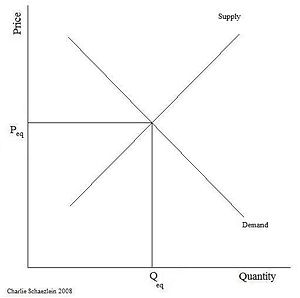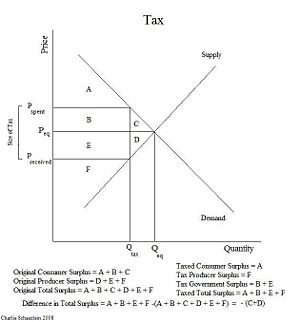Supply and demand/Tutorials: Difference between revisions
imported>Nick Gardner |
imported>Nick Gardner |
||
| Line 4: | Line 4: | ||
==Graphical representations | ==Graphical representations== | ||
===The shape of the demand curve=== | ===The shape of the demand curve=== | ||
The converse of the premise stated in the article is that the less of a thing that a person possesses, the more he is prepared to pay to acquire a little more of it. That means that, as price is increased, a progressively larger increase is needed to produce a given reduction in demand. Thus the slope of the price/demand curve increases as price is increased and falls as price is reduced - leading to a curve that is concave when viewed from above. | The converse of the premise stated in the article is that the less of a thing that a person possesses, the more he is prepared to pay to acquire a little more of it. That means that, as price is increased, a progressively larger increase is needed to produce a given reduction in demand. Thus the slope of the price/demand curve increases as price is increased and falls as price is reduced - leading to a curve that is concave when viewed from above. | ||
| Line 14: | Line 14: | ||
This is the stylised representation of the law of supply and demand | This is the stylised representation of the law of supply and demand | ||
that is often used for teaching purposes (with the | that is often used for teaching purposes (with the supply and demand | ||
unfortunately). As it stands it adds nothing to Marshall's | labels reversed, unfortunately). As it stands it adds nothing to Marshall's | ||
statement, but it is used as an introduction to the use of such | simple statement, but it is used as an introduction to the use of such | ||
diagrams to illustrate the concepts of consumer's and supplier's | diagrams to illustrate the concepts of consumer's and supplier's surplus, | ||
and to demonstrate the impact upon them of taxes and subsidies, as in the | |||
following diagram. | |||
| Line 69: | Line 71: | ||
- | - | ||
==The algebra of elasticity== | ==The algebra of elasticity== | ||
Revision as of 05:43, 27 April 2008
(Introduction to be added)
Graphical representations
The shape of the demand curve
The converse of the premise stated in the article is that the less of a thing that a person possesses, the more he is prepared to pay to acquire a little more of it. That means that, as price is increased, a progressively larger increase is needed to produce a given reduction in demand. Thus the slope of the price/demand curve increases as price is increased and falls as price is reduced - leading to a curve that is concave when viewed from above.
-
The basic diagram
This is the stylised representation of the law of supply and demand
that is often used for teaching purposes (with the supply and demand
labels reversed, unfortunately). As it stands it adds nothing to Marshall's
simple statement, but it is used as an introduction to the use of such
diagrams to illustrate the concepts of consumer's and supplier's surplus,
and to demonstrate the impact upon them of taxes and subsidies, as in the
following diagram.
-
-
-
-
Consumers surplus and the effect of tax
-
-
-
-
-
-
-
-
-
-
-
-
-

